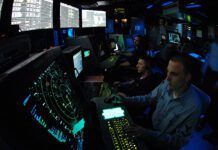
The heat energy produced by the friction of a passenger jet’s braking system during landing could be captured and converted into electricity, according to recent research by an engineering team in the U.K. “Taxiing is a highly fuel-inefficient part of any trip by plane, with emissions and noise pollution caused by jet engines being a huge issue for airports all over the world,” said Paul Stewart, a professor at the University of Lincoln, who led the research. Motor-generators built into the landing gear could capture the wasted heat and convert it into electricity, which would then be stored and supplied to the in-hub motors in the wheels of the plane when it needed to taxi. An Airbus A320, for example, could potentially produce up to 3 megawatts of power, Stewart said.
“We explored a wide variety of ways of harnessing that energy, such as generating electricity from the interaction between copper coils embedded in the runway and magnets attached to the underside of the aircraft, and then feeding the power produced into the local electricity grid,” Stewart said. “If the next generation of aircraft that emerges over the next 15 to 20 years could incorporate this kind of technology, it would deliver enormous benefits, especially for people living near airports. Currently, commercial aircraft spend a lot of time on the ground with their noisy jet engines running. In the future this technology could significantly reduce the need to do that.”


































